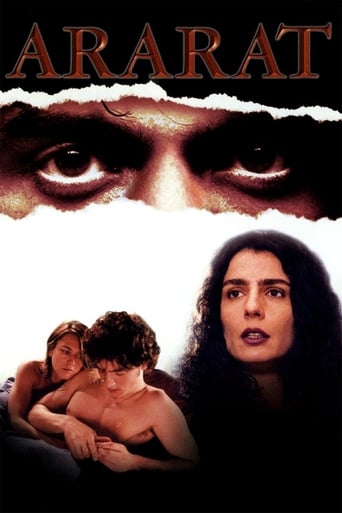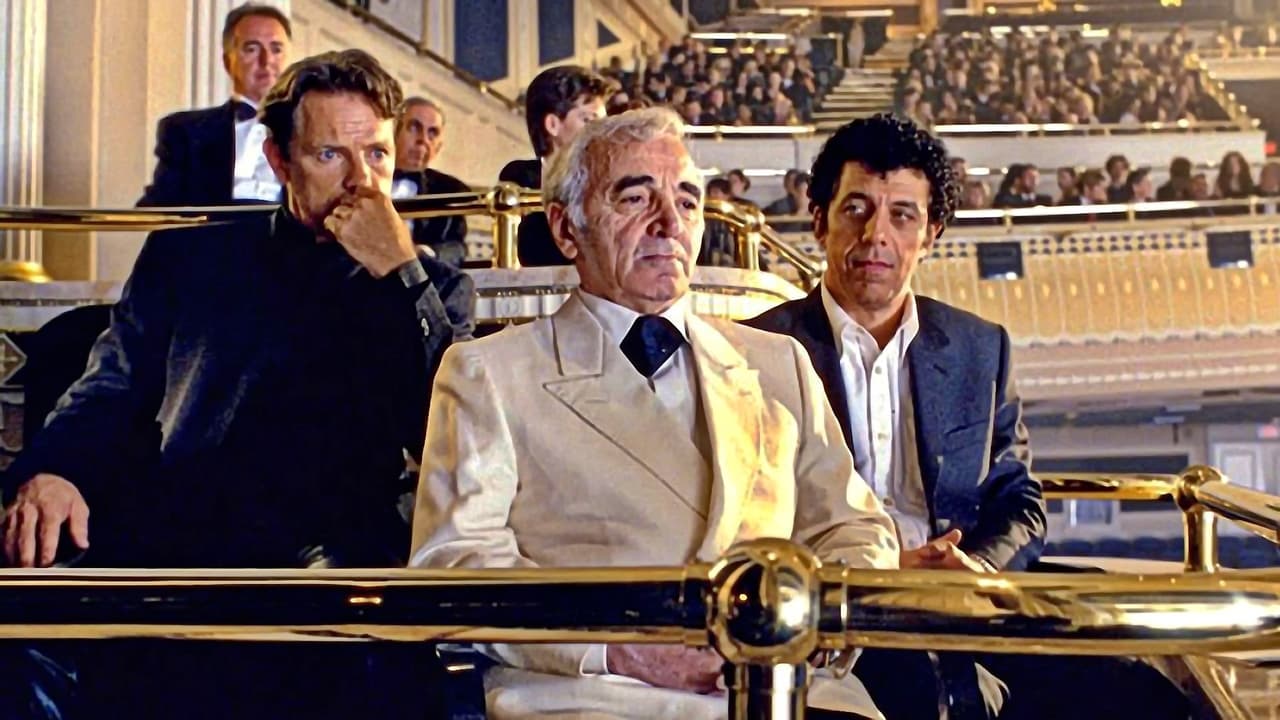tieman64
"Who, after all, speaks today of the annihilation of the Armenians?" – Adolf HitlerDuring and after World War 1, the Ottoman Empire deliberately and systematically killed one and a half million Armenians. Though this event is still denied by Turkey, many modern scholars deem the Armenian Holocaust to be one of the first modern genocides, predating the Jewish Holocaust by several decades (the Herero and Namaqua Genocides occurred in 1904, predating the Armenian killings by a decade).The murders began in early 1915, the Ottoman authorities first targeting Armenian intellectuals and community leaders. The "brains" eradicated, the Ottoman military then began picking off the confused Armenian populace. They were forced out of their homes, deprived of food and water and made to march into the deserts of Syria, where they were either shot or left to die. Directed by Atom Egoyan, "Ararat" examines man's indifference to these crimes, the problem of artistically representing genocide, the historical ramifications of genocide and the elusive nature of truth. The result is a bizarre film that is less a satisfying piece of drama than an interesting whirlwind of ideas.All of Egoyan's trademarks are present in "Ararat". Consider the director's earlier films, all of which revolve around some traumatic past event, their large casts gradually piecing together the past until some cohesive "truth" or "revelation" is revealed. These films are comprised of seemingly disconnected sequences and seemingly unrelated characters, vignettes that only begin to gel during some revelatory climax. These films also switch between eras, their narratives jumping from past to present to future, until history is concretized and the traumatic event is resolved in the present. Virtually all of Egoyan's films adopt this narrative structure, which seems to blend a modernist search for truth with a decidedly post-modern admittance that truth requires the careful sorting of both testimonials and subjectivity."Ararat" follows this same pattern. We're introduced to an Armenian artist who lived during the Armenian Holocaust. He paints a picture of his mother that, 8 decades later, is used by an art teacher as a gateway into spreading the word of the Armenian genocide. Finding this artist to be intriguing, a Hollywood director then uses the long dead artist as the central character in a big budget movie about the Armenian Holocaust. The director turns the dour artist into an action hero, romanticising his life and embellishing history. The cast of this film is itself comprised of Turks and Armenians. The Turks naturally play the bad guys and see the whole film as a work of fiction. The Armenians, in contrast, believe the film to be factual, despite the obvious embellishments. One Turkish actor, an obvious homosexual, has an elderly father who works at an airport security desk. He permits an Armenian boy into Turkey with both bags of cocaine and footage of the genocidal killing fields. The father's acceptance of the lawless Armenian boy mirrors his acceptance of his gay son. The Armenian boy is himself the son of a terrorist who fought against the Turks, whilst the boy's lover is the daughter of a man whom she believes was killed by the boy's father.Confused? This complex web of characters is really a convoluted web of metaphors. Egoyan's points: Firstly, your parents may be the offspring of either the oppressors or the oppressed, but this does not implicate them in evils nor does it taint their character. Secondly, art is impotent unless it is aligned with a political cause and even then it is often misrepresented, both as a work of art and as a piece of history. Thirdly, to demonize, to deem the enemy animals or homosexuals, is to ignore their voice and their story. Fourthly, Hollywood is incapable of representing any Holocaust, film naturally seductive, romanticising events and turning their characters into heroes or messiahs. Fifthly, history itself is comprised of nothing but embellished stories passed down from generation to generation, each side tweaking the tale to fit their own ideological viewpoints. Sixthly, one can never know the past. It is lost, fragmented, and so forever lacking closure.What the film fails to do - what all Holocaust films never bother to do - is establish why and how such an event could take place. The Ottoman Empire, which was predominantly Muslim, treated Armenians, who were predominantly Christians, as second class citizens. They were not given equal rights and were subject to strict laws, the breaking of which would lead to fines and executions.At the same time, the Armenians were steadily amassing wealth and forging successful businesses. Because of economic problems, and their fears that Armenians would support Russia during, before and after World War 1, or even demand autonomy, the Ottoman authorities thus began a propaganda campaign which demonized the Armenians and so "justified" their eventual eradication and expulsion, freeing land for the Muslim majority and the country's wealthy rulers.But the film doesn't seek to portray these objective truths or examine the global class, religious or political factors which led to the holocaust. Preoccupied with subjectivity, the film never digs towards its issues roots. Ironically, this is its greatest asset.7.5/10 – Law professor Raphael Lemkin, who coined the term "genocide" in 1943, has stated that he did so with the fate of the Armenians in mind. The birth of techno-genocide is a serious issue. Egoyan's film, though the director tries hard, doesn't live up to the scope and complexity that such a serious story demands.
anatolian
As the president of Turkey announced to the world 1 year ago, Turkish government is opened all of the Ottoman's archive they have which is millions of documents for all history researches about world war 1 and sending all Armenian to the place that they can live peacefully. But neither the Armenian government is seem to use this opportunity nor they didn't even consider it as an option.Moreover they are still not opening their archives they are just blaming with not giving reason Because they know that its not a genocide its just what they use to get elected in their country and targeting a big enemy so that they can be united.Turkey doesn't have millions of dollars to spend on this issue there are no movies about so this called genocide that made in Turkey. What we do make special effects and editing in those armenian genocide and Ararat movies because in Armenia they don't have that technology we help them to express theirselves. Because we are indulgent to every opinion and we respect them but we cant except thing that didn't happened.
smilebuddha
I am not in any way Armenian or Turkish, nor do I have any relations with Armenians or Turks. However, I believe that this was an excellent movie and do not see the need for anger or offense to a movie. Yes, there may not be historical or political support or reference, and substantial evidence is not provided for every claim to truth in the movie. That becomes irrelevant though, once you consider that this movie may be based from an emotional standpoint and political and historical propaganda was not the purpose. It must also be taken into consideration that it is, in the end, a MOVIE, which is a form of media notorious for distorting facts and presenting biased opinions.
dakota73060
I saw this movie in the summer of 2003, and it has remained one of my favorite movies of all time. No, the subject is not light, I cried several times during this film. It tore my guts out.The music, the acting were all wonderful. Atom Egoyan is an amazing filmmaker, and Ararat is another fine work to his credit.(For those of you trashing this film saying you "don't get it," perhaps historical dramas aren't your bag. If you don't know the story behind this film, no you won't understand it.) Someday I hope to travel to Armenia to show my daughters where their ancestors came from.


 AD
AD


